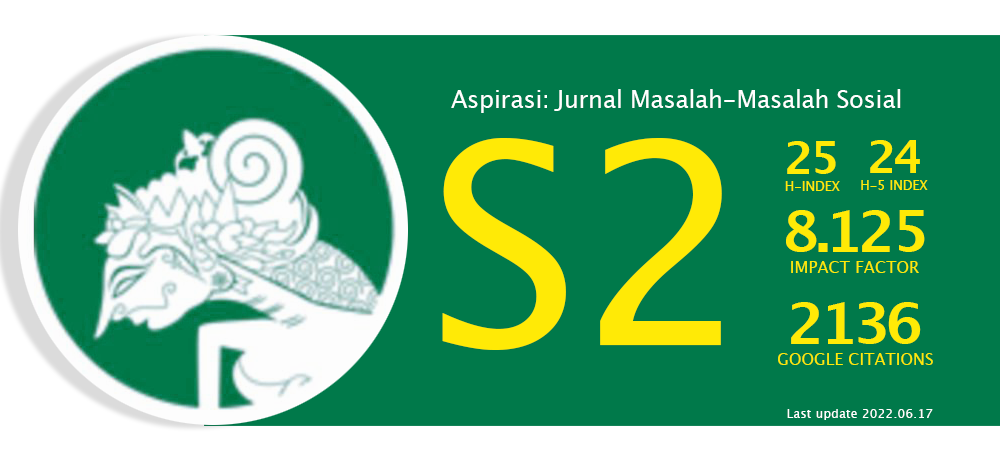ULASAN METODOLOGI KUALITATIF: WAWANCARA TERHADAP ELIT
Abstract
Keywords
Full Text:
UntitledReferences
Buku
Glassman, William E. & Hadad, Marilyn. 2009. Approaches to Psychology. 5thed. Bershire: McGraw-Hill.
Singh, A.K. 2004. Tests, Measurements and Research Methods in Behavioral Sciences. Patna: Bharati Bhawan.
Stewart, C.J. & Cash W.B. 1982. Interviewing Principles and Practices. 3rd edition. Iowa: Wm. C. Brown Company Publisher.
Jurnal
Aberbach, J.F., & Rockman, B.A. 2002. “Conducting and Coding Elite Interviews.” Political Science and Politics. 35, 673-676.
Best, H. 2011. “Does Personality Matter in Politics? Personality Factors as Determinants of Parliamentary Recruitment and Policy Preferences.” Comparative Sociology. 10, 928–948. DOI: 10.1163/156913311X607638.
Burton, E.M.H., Hughes, D.A., Victora, D.G. 2011. “The Behavioral Psychology of Elite Decision Making: Implications for Political Science.” Elsevier, 1-15.
Conti, J., & O’Neil, M. 2007. “Studying power: Qualitative methods and the global elite.” Qualitative Research, 7 (1), 63-82.
Crichlow, S. 2002. “Legislators’ Personality Traits and Congressional Support for Free Trade.” Journal of Conflict Resolution, 46, 5, 693-711. DOI: 10.1177/ 002200202236170.
Dietrich, B.J., Lasley, S,. Mondak, J., Remmel, M.L., & Turner, J. 2012. “Personality and Legislative Politics: The Big Five Trait Dimensions Among U.S. State Legislators.” Political Psychology, 33, 2, 195-210, DOI: 10.1111/j.1467-9221.2012.00870.x.
Dille, B. 2000. “The Prepared and Spontaneous Remarks of Presidents Reagan and Bush: A Validity Comparison for At-a-Distance Measurements.” Political Psychology, 21, 3, 573-585.
Dyson, S.B., & Preston, T. 2006. “Individual Characteristics of Political Leaders and the Use of Analogy in Foreign Policy Decision Making.” Political Psychology, 27, 2, 265-288. Dyson, S.B. 2006. “Personality and Foreign Policy: Tony Blair’s Iraq Decisions.” Foreign Policy Analysis, 2, 289–306.
Dyson, S.B. 2007. “Alliances, Domestic Politics, andLeader Psychology: Why Did Britain Stay out of Vietnam andGo into Iraq?.” Political Psychology, 28, 6, 647-666.
Dyson, S.B. 2009. “Cognitive Style and Foreign Policy: Margaret Thatcher’s Black-and-White Thinking.” International Political Science Review, 30, 1, 3348. DOI: 10.1177/ 0192512108097055.
Harvey, William. S. 2011. “Strategies for Conducting Elite Interviews.” Qualitative Research, 11 (4), 431-441.
Holt. A. 2010. “Using the telephone for narrative interviewing: a research note.” Qualitative Research 10 (1): 113–121.
Jensen, T., & Winzen, T. 2012. “Legislative negotiations in the European Parliament.” European Union Politics, 13, 188, 118-149. DOI: 10.1177/ 1465116511419982.
Kearns, D. 1976. “Lyndon Johnson’s Political Personality.” Political Science Quarterly, 91, 385–409.
Keller, Jonathan W. & Yang, Yi Edward. 2008. “Leadership Style, Decision Context, and the Poliheuristic Theory of Decision Making: An Experimental Analysis.” Journal of Conflict Resolution, 52, 687-712.
Knoke, David. 1993. “Networks of Elite Structure and Decision Making.” Sociological Methods & Research, 22 (1), 23-45. Latcham, J. 1982. “President McKinley’s active-positive typology: A comparative revision with Barber’s typology.” Presidential Studies Quarterly, 12, 491–521.
Laurila, J. 1997. “Promoting research access and informant rapport in corporate settings: Notes from research on a crisis company.” Scandinavian Journal of Management, 13, 407-418.
McConaughy, J. B. 1950. “Certain personality factors of state legislators in South Carolina.”American Political Science Review, 44, 897-903.
Mikecz, Robert. 2012. “Interviewing Elites: Addressing Methodological Issues.” Qualitative Inquiry, 18, 482-493.
Ostrander, S.A. 1993. “Surely you’re not in this just to be helpful. Access, rapport, and interviews in three studies of elites.” Journal of Contemporary Ethnography, 22 (1): 7–27.
Schoen, Harald. 2007. “Personality Traits and Foreign Policy Attitudes in German Public Opinion.”Journal of Conflict Resolution, 51, 408-430.
Smith, K.E. 2006. “Problematising power relations in ‘elite’ interviews.” Geoforum, 37: 643–653.
Stephens, N. 2007. “Collecting data from elites and ultra elites: telephone and face-to-face inter views with macoeconomists.” Qualitative Research, 7(2), 203–216.
Wright, G.C. 2007. “Do Term Limits Affect Legislative Roll Call Voting? Representation, Polarization, and Participation.” State Politics & Policy Quarterly, 7, 3, 256-280.
Zuckerman, H.A. 1972. “Interviewing an Ultra-elite.” The Public Opinion Quarterly, 36: 159–175.
DOI: https://doi.org/10.46807/aspirasi.v4i2.501
Refbacks
- There are currently no refbacks.







